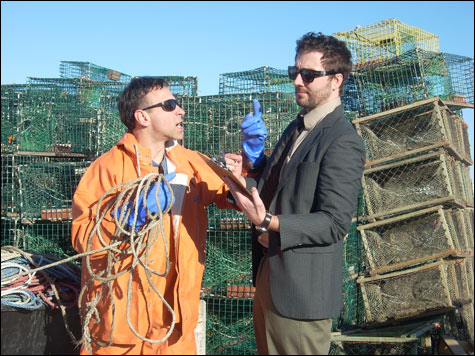
TENSE LINES The Last Fish in the Sea. |
For 10 years now, Acorn Productions has provided an annual platform for both new and established Maine playwrights to see their work enacted by live bodies under hot lights. Herein are some highlights of the festival's 10 short plays, which run in two alternating programs for the next two weekends, with a double-header on April 29 and a grand finale event on April 30, when the speedily crafted creations of the second annual 24-Hour Portland Theater Project will be performed for the public.
Schedule A of the festival launches with Marie Coyle's slight but utterly delicious satire of undergraduate entitlement, Class. In rapid-fire rhetorical spurts, we hear the increasingly frenzied plaints of three archetypal students — a sorority president (Vanessa Romanoff), a laconic theater major (Julia Reddy), and an activist of myriad causes (Heather Scamman) — as each appeals her grade on a Moby Dick essay. Coyle nails their patois and general m.o., and Tess Van Horn's direction of the three excellent actors is cheeky and quick-witted.
The subject is a soberer one in Kathy Hooke's Silence and Slow Time, in which young professional Sarah (Kara Haupt) visits her aging grandmother (Muriel Kenderdine), who's suffering from dementia and is near the end. In an extended monologue, Sarah struggles to come to terms with death in life. This could be ground ripe for the maudlin, but with Hooke's skillful writing (including a rather transporting little turn when the older woman finally speaks) and Haupt and Kenderdine's beautiful acting (under Van Horn's luminous direction) it is poignant, it surprises, and it has the ring of truth.
Schedule A closes with the most ambitiously topical of the festival's plays, Cullen McGough's dramatic treatment of Maine commercial fishing, The Last Fish in the Sea. Everybody working on Captain Zane's trawler is feeling the industry's tensions: Zane (Lee Kerr) rails against the regulations that push out small-time boats like his, his deck boss Bobby (Hal Cohen) yearns to move up to captaining, and young Derrek (Jesse Leighton) will soon have a child to support. Finally, Lenny (Andrew Sawyer), as a representative of the contentious National Marine Fisheries Service observing the boat's catch, gets the undeserved brunt of everyone's aggression. McGough knows this world well — not just its big issues but its people, their psychologies, and their vernacular. His script is textured with quotidian concerns and creatively salty insults, and with its unexpected, haunting ending, it provocatively transcends straight-forward social realism.
The other shows of Schedule A are Shannara Gillman's The Rope Swing, in which high school sweethearts meet again as adults, and Larry Crane's quirky romantic comedy Aiming Off, about a man and a woman navigating the great outdoors and myriad cartographical double entendres.
Schedule B holds the festival's most lyrically fertile show, Jefferson Navicky's Infestation. Gary, a tortured thief (Bill McLean), and Thelma, a sanguine artist (Elizabeth Chasse, exquisitely), are in love but at odds over Gary's endless angst, a situation brought to fever-pitch by a fruit-fly invasion of their apartment. Over the course of their alternately plain-spoken and surreal banter and dreams, the couple seeks the source of the infestation. Navicky crafts complex and evocative psychological portraits of their need, hurt, and desire, which Karen Ball directs with impressive sensitivity.